6A Tweed Office Park, 24-28 Corporation Circuit, Tweed Heads South NSW 2486
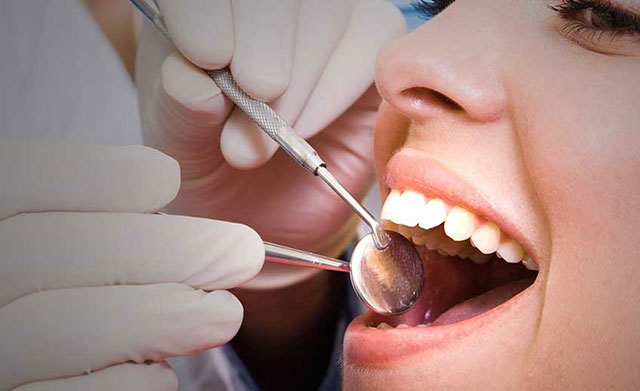
Prevention is the key to keeping teeth healthy while minimising chances of decay, disease and infections. Diagnosing dental problems at an early stage is essential as it means we can fix the problem before it worsens and ensures you keep a happy smile for life.
Having a check-up and professional clean every 6 months is quick, simple and will assist in preventing any nasty surprises like tooth decay or gum disease. A professional clean will remove plaque, calculus deposits, coffee/cigarette stains and the professional fluoride will help prevent decay and reduce sensitivity.
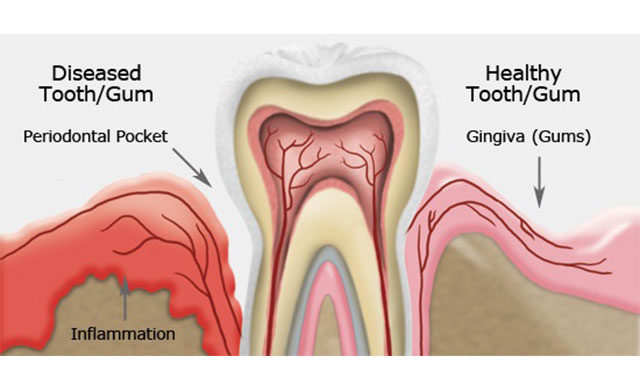
Periodontal disease is inflammation of the gums and surrounding areas, which may affect the way teeth are supported in the jaw. It is the most common cause of tooth loss and if signs of gum disease are noticed, it is important to have your symptoms, gums and medical history assessed to detect this condition as early as possible. The type of treatment you receive will depend on the severity of gum disease.
Gingivitis is a form of periodontal disease, in such cases we will clean your teeth using specialized ultrasonic scalers and conventional hand scalers as well as providing advice on how to brush and floss effectively. However, if left untreated this can progress to periodontitis, requiring more extensive cleaning to remove bacteria, plaque and hardened deposits from deeper pockets surrounding each tooth. Cleaning these deeper pockets and hardened deposits are not possible to do at home and require professional tooth scaling and root planing to do so effectively. This may be done at our surgery over several appointments. To ensure the procedure is pain-free, we can use local anaesthetic to numb your gums before scaling for your comfort.
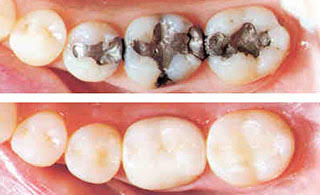
With recent advances in technology, patients are now able to have cavities restored with tooth-coloured materials (composite resin). In comparison to traditional amalgam fillings, they are a much safer alternative as the composite resin does not release mercury and does not expand and cause the teeth to crack. These white fillings do not need as much tooth structure to be removed and are less invasive. The tooth-coloured material also has the advantage of being highly cosmetic, natural and can be used on both the front and back teeth.
When there is 30-50% tooth decay, composite resin fillings are a good option however in cases where there is significant loss of tooth structure, your dentist may recommend a ceramic onlay or crown. The ceramic helps to reinforce any remaining tooth structure for a more long-term solution. Where teeth are decayed, damaged or worn, dental fillings are used to restore them to function. We will advise you on which type of procedure is best for you.

Here at South Tweed Dental, we believe that children should enjoy a comfortable and stress-free dental visit. With the right guidance, children easily develop a positive approach to dental visits that helps to promote great oral hygiene habits.
It is important that children start their dental visits early to ensure that we can give your little one their best smile for life. As soon as they get their first few teeth it is vital that children look after these primary (baby) teeth to minimise the risk of tooth decay, and prevent orthodontic (crowding) problems as they grow older. We endeavour to take the time to make every child feel happy and comfortable during their visits at South Tweed Dental.
We are also delighted to have a visiting Orthodontist working in conjunction with our team to provide patients with effective solutions to help straighten their teeth for life.

This procedure is also known as endodontic treatment. The main purpose is to save a tooth, which due to extensive decay, disease or injury has resulted in a diseased pulp (nerve and blood vessels) within the tooth. The pulp plays an essential role in providing nutrients to the tooth. If the pulp tissue dies, it is important to remove this nerve tissue in order to prevent spread of infection and loss of the tooth. Root canal treatment involves removing the diseased nerve, cleaning the canal/s of the tooth, and sealing the tooth off. It usually takes 2 to 3 visits to complete the treatment. A root canal treated tooth will often require a crown in order to provide strength, durability and the best restoration to protect the underlying treatment.
Using the latest advanced equipment and techniques, many patients have had excellent outcomes with their root canal treatment lasting many years, and with the proper care, root canals can last a lifetime. In some instances, extraction may be the best option as root canal treatment may not be appropriate for you. Our qualified team will guide you regarding which treatment will be most successful for your tooth.

In your late teens to early twenties (or even later in some people), wisdom teeth usually come through the gums with most people having four wisdom teeth. Problems arise when there is not enough space at the rear of the jaw and the wisdom teeth are not able to emerge completely to be functional. These problematic teeth can become wedged in or impacted, leading to severe problems, infection and pain.
During your wisdom teeth extraction, our team will ensure you have a safe and gentle procedure. The area is numbed with local anaesthetic prior to the extraction and your teeth will be removed before you know it. Written post-operative instructions will be provided for you after the extraction to ensure you know precisely what to do to achieve a speedy and worry-free recovery.
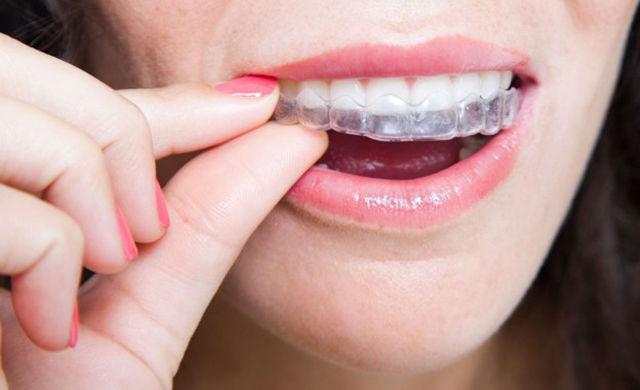
An occlusal splint is designed to be worn at night when sleeping. It is a slim, durable acrylic guard fitted to the upper jaw, which covers the biting surfaces of your upper teeth. The device will not prevent you from clenching or grinding, instead it relieves some of the pressure on the jaw joints by guiding the jaw into a neutral position and is very effective in protecting your teeth against the destructive forces of bruxism (grinding of your teeth).

Our team can make you a custom-fitted mouthguard after taking an impression of your teeth. The impression allows your dentist to accurately assess your mouth and provide the best fit, size, coverage and thickness in a mouthguard that is made just for you. Our dentist will recommend the best type of mouthguard appropriate for your sport and make an assessment of your risk factors. Our comfortable custom-fitted mouthguards have maximum resistance against being dislodged yet will still allow you to talk and breathe normally.
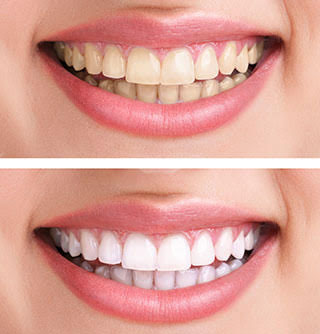
If you find yourself hiding your smile due to coffee, tea, red wine or cigarettes stains, teeth whitening may be your answer. Our team can talk to you about which treatment options are best for you. Here at South Tweed Dental, we offer two options for professionally bleaching your teeth.
The option known as the “World’s Fastest Bleach” (PolaOffice+) is an award-winning in-chair procedure which takes less than 30 minutes and provides instant results of up to 8 shades lighter teeth. You leave our surgery with a whiter, brighter smile instantly.
Alternatively, home bleaching is an option with dental trays made specifically to fit your teeth. Our friendly team will discuss with you how to achieve your new white smile all in the comfort of your own home.
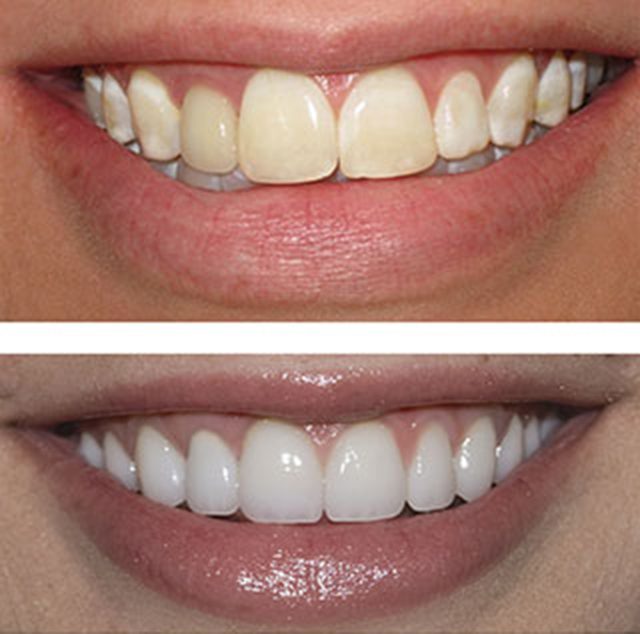
Porcelain veneers are a wonderful way of improving your smile. A custom made, shell-like material is specifically prepared for you and acts like a new outer layer for your teeth. It has outstanding durability, strength and gives a natural look and feel as it is permanently bonded to the teeth, enhancing your smile.
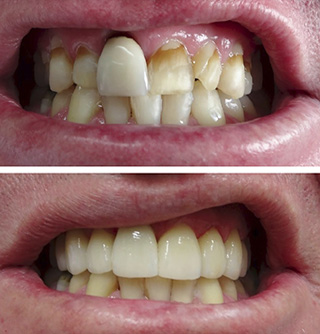
A crown is an ideal solution for a badly broken down tooth with a healthy nerve or one that has been successfully root canal treated. When teeth are broken, badly decayed, severely discoloured or have old and large fillings, crowns are used like a protective cap for the entire visible part of the tooth. Crowns are the strongest kind of restoration for a broken down tooth and are usually made of ceramic. They brighten your smile and improve the appearance of your natural teeth.
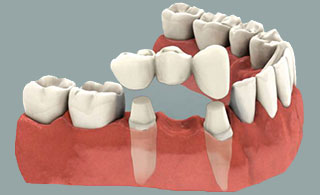
A bridge is a false tooth, fused between two ceramic crowns to fill the gap left by a missing tooth. Two crowns are attached to natural teeth on either side of the missing tooth. Depending on where the gaps are in the mouth, your dentist will select what material the bridge should be made of. Bridges preserve normal function and a normal bite for the jaw joints as they keep teeth from drifting into the space created by a missing tooth. Unlike a denture, which you have to remove every day and clean, a bridge is a permanent fixture to your teeth thus being extremely comfortable.

Dental implants are used to replace missing teeth and restore your natural smile. It involves placing a metal screw fixture into the jawbone and a false tooth or set of teeth is anchored to this. Over time the implant fixture fuses with the jaw bone in a process known as osseointegration and this maintains a strong support for the false tooth. Implants have a good life span and are an excellent choice to replace a missing tooth.

Dentures may be the best option for you if you have lost some or all of your natural teeth due to injury, disease or tooth decay. They will enable you to speak and eat properly as well as providing your face with support. Full dentures replace all the teeth in your mouth, whereas partial dentures rest on your natural teeth and replace your missing teeth. An immediate denture is one that is placed in your mouth as soon as any remaining teeth planned for removal are removed.
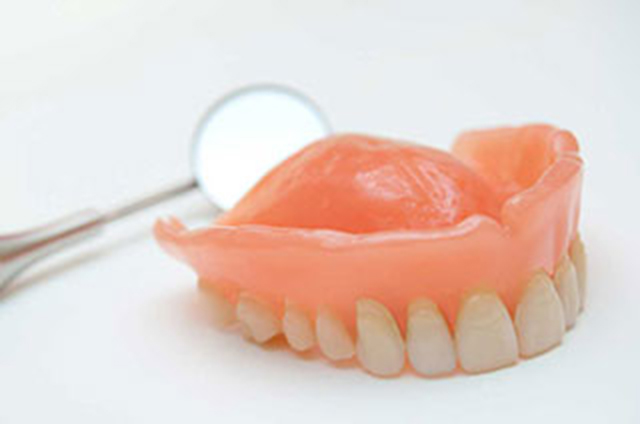
Resurfacing of the fitting surface of a denture is called relining. As your bone and gums slowly shrink over time this affects the shape of the ridges that support your denture. Often this results in a denture that no longer fits as well as it used to. A reline for your complete or partial denture may be the solution to this problem
There are two common types of relines - hard and soft relines. A hard reline is completed by placing soft putty inside the denture and placing the denture inside the mouth, this allows your gums and soft tissues to mould it into shape. A hard acrylic replica is created when the putty is taken out and sent to our dental laboratory. The dental laboratory then adds to your original denture and sends back the relined one to be adjusted as required to fit well in your mouth.
A soft reline uses a softer, more pliable material but follows the same procedure. This technique is often used for patients who get sore spots from wearing dentures, making hard relines too painful to wear. It is used as a temporary comfortable replacement while the gums heal and is replaced with a hard reline once the healing process is over.
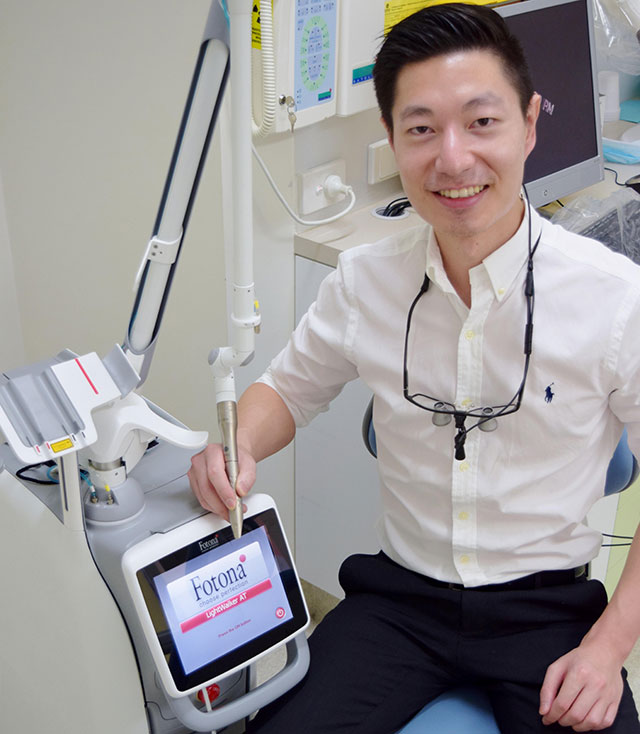
Here at South Tweed Dental, we are able to provide a completely safe treatment for snoring using the highly-advanced Fotona LightWalker AT Laser, via a procedure called NightLase®. It involves the use of the Er:YAG laser in a non-ablative (non-cutting) treatment of the soft palate and surrounding areas. It involves no local anaesthetic (needles) and is a “walk-in walk-out” procedure with no downtime, pre-operative or post-operative pain.
NightLase® consists of a series of 3 x 30 minute treatments, 2-4 weeks apart. Immediate results are obtained in most patients after just the first treatment, with an average of 45% reduction in snoring.
Snoring is a significant but relatively unspoken about condition affecting between 40-50% of adults and sometimes children as well. It affects both the snorer due to their disturbed sleep patterns depriving them of rest, which is accompanied by a range of consequent health problems, as well as the bed partner who can experience sleepless nights and fatigue as a result.
The majority of people who snore generally have a blockage in the back of their throat when sleeping, which obstructs their airway. This usually occurs if the patient has a lot of sagging skin in the soft palate region. Snoring is the audible vibration of these respiratory structures being the tongue, back of the throat and soft palate.
For the majority of snorers who do not have sleep apnoea, the NightLase® procedure works perfectly in about 80% of people as an individual treatment. The laser stimulates new collagen to form under the skin of the soft palate and the back of the throat. This in turn naturally tightens up the region, opening up the airway and allowing the free flow of air within these passages. The result is a significant reduction to the pre-existing audible vibrations and therefore successful treatment of the patient’s snoring.
